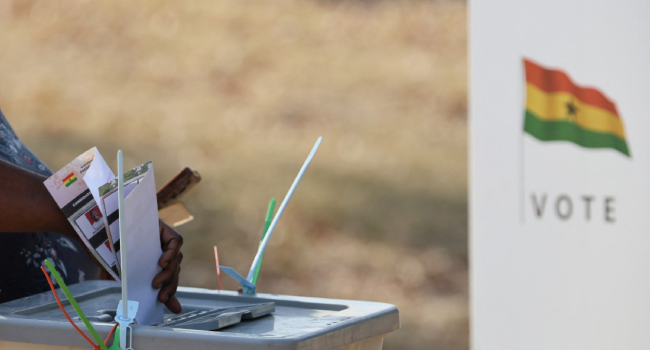By Adeyemi Adekunle
Ghanaians cast their votes on Saturday in a fiercely contested presidential election dominated by the country’s economic struggles. Vice President and former central banker Mahamudu Bawumia, representing the ruling New Patriotic Party (NPP), faced off against opposition leader and former president John Mahama of the National Democratic Congress (NDC) in a race that has spotlighted inflation, debt, and everyday hardships.
Polling stations across the country opened promptly at 7:00 a.m. GMT, with lines forming early in major cities like Accra and Kumasi. The election comes at a critical moment for the West African gold and cocoa-producing nation, which has grappled with a severe debt crisis, soaring inflation, and a $3 billion bailout program secured with the International Monetary Fund (IMF). For many voters, the economic downturn has taken center stage.
“We want to vote for change. The economic situation is very hard,” said James Nsiah, a retired policeman waiting to cast his ballot in the capital, Accra. “The cost of living is high.” Nsiah’s sentiment echoed the frustrations of many Ghanaians struggling to afford basic goods and services.
This election marks the end of President Nana Akufo-Addo’s tenure after his constitutionally mandated two terms. As the country’s leadership prepares for transition, citizens are also electing new members of parliament, further raising the stakes for both major parties.
The contest between the NPP and the NDC — two political giants who have alternated power since Ghana’s return to multi-party democracy in 1992 — remains tight. Bawumia, Akufo-Addo’s Vice President, has campaigned on continuing the current administration’s policies while promising economic recovery. Meanwhile, Mahama, a seasoned politician and former president, is positioning himself as the candidate of change, capitalizing on widespread discontent.
To safeguard the integrity of the electoral process, Ghana’s government took the significant step of closing all land borders from Friday night until Sunday. “This measure is to ensure security and the integrity of the vote,” the Interior Ministry said in a statement. Security forces were also visibly deployed in key locations to maintain calm as voting proceeded.
Political analysts suggest the election’s outcome hinges on voters’ perceptions of who can best restore Ghana’s economy. “This is more than a leadership contest; it’s a referendum on economic management,” said Kwame Asare, a political commentator based in Accra.
Ghana’s reputation for political stability in a region often marred by electoral disputes has instilled confidence in its democratic institutions. International observers have lauded the country’s election preparedness, noting peaceful campaigns and well-organized polling logistics.
Voting is scheduled to close at 5:00 p.m. GMT, with early results expected to trickle in by Sunday. The full outcome of the presidential race is anticipated by Tuesday, setting the stage for what could be a defining moment in Ghana’s political and economic trajectory.




